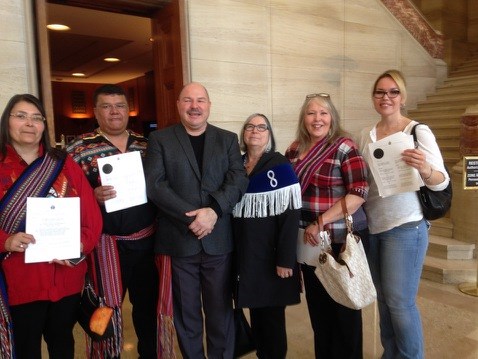Local Métis leaders are preparing to take the next steps forward after a historic ruling in the Supreme Court of Canada just under two weeks ago.
Local Métis leaders are preparing to take the next steps forward after a historic ruling in the Supreme Court of Canada just under two weeks ago.
Supreme Court judges unanimously ruled at that Métis people and non-status Aboriginals are considered “Indians” under the 1867 Constitution Act, granting them the same rights and status as First-Nations people.
Several of those local leaders, Métis Nation of Alberta Region One President Diane Scoville, Métis local 2002 president Joe Blyan, Métis local 1949 president Jack Quintal, and Métis local 1909 president Melina Scoville, were at the Supreme Court in Ottawa the day the ruling was handed down, and said the feeling of being there first-hand isn’ t easy to describe.
“You had to be there,” said Quintal. “We were all there in a positive attitude that this was going to be a win - we didn’ t see any other way.”
Joe Blyan, who knew a complainant in the case - Harry Daniels - personally, said it’ s something he’ s been waiting for for a long time.
We didn’ t start this yesterday,” he said. “I was so excited to be there. I drove to Ottawa and back be cause I wanted to be there - I had to be there.”
Scoville said the symbolic significance of the ruling was immense.
“This has been coming for a long time,” she said. “We helped shape Canada to what it is today, and to hear that [the ruling]... was just a big ‘Wow’ .”
The ruling stretches beyond the symbolic though - it opens many doors for Métis people that were closed to them before. Prior to the ruling, the federal government had no official responsibility to the Métis people. After the ruling, that’ s all changed. Better access to federal funding, resources and more is now a reality for the Métis people, and its something the local leaders are still trying to wrap their heads around. They all agree that the transition is going to take some time and figuring out.
“We’ ve been denied in so many ways: Financially, access to programs, to services - they were never available to us,” said Scoville. “To me, we have to start negotiating government to government on these talks. What is it going to look like?”
Melina Scoville said though it marked the end of a long battle, the Supreme Court ruling is another beginning in other ways.
“I think we’ re just at the tip of the iceberg for what this could mean,” she said.
Though he’ s pleased with the ruling Quintal hopes that the ruling will lead to more opportunities for Métis people. He said his people aren’ t looking for handouts from the government.
“We work for what we get. We’ ll always work for what we get. Social programs aren’ t what we’ re looking for - we need work, we need opportunities, like anyone else out there,” he said.
In any case, Blyan is looking forward to taking the next steps following the significant ruling.
“It’ s a brand new day, and that’ s exciting,” he said.
